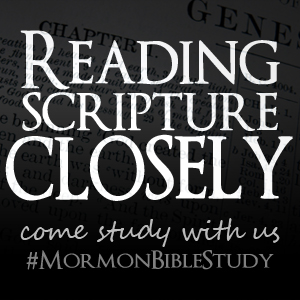The more time I spend studying the scriptures, the more that I am convinced that there is great benefit and clarity in taking time to read it carefully and closely. The more exactly that our understanding of the gospel aligns with what our Father in Heaven is actually trying to teach, the better off we are. Sloppy thinking leads to sloppy conclusions, and this becomes particularly problematic in gospel contexts. He has given us the power of reason, and expects us to develop the ability to think logically, carefully, and thoroughly, in order to detect fallacious ideas and doctrines: this is one of the ways we can try to avoid being taken in when the doctrines of men are mixed with scripture and passed off as Truth.
"We expect them to think. We expect them to investigate. We expect them to use their minds and dig deeply for knowledge in all fields. If we have a motto, it is this: ‘The glory of God is intelligence.’ "
-Gordon B. Hinckley
(Teachings of Gordon B. Hinckley [1997], 127)
The Lectures on Faith were used in the School of the Elders in Kritland, and while they are no longer part of the Doctrine and Covenants, I find this passage in particular to be very instructive:
Let us here observe, that three things are necessary, in order that any rational and intelligent being may exercise faith in God unto life and salvation.
First, The idea that he actually exists.
Secondly, A correct idea of his character, perfections and attributes.
Thirdly, An actual knowledge that the course of life which he is pursuing, is according to his will.—For without an acquaintance with these three important facts, the faith of every rational being must be imperfect and unproductive; but with this understanding, it can become perfect and fruitful, abounding in righteousness unto the praise and glory of God the Father, and the Lord Jesus Christ.
-Third Lecture on Faith
In particular, here, the second point is important: in order to exercise faith unto life and salvation, we must have not only a knowledge of the nature of God, but a correct knowledge. In other words, God is knowable -- and knowing Him is critical to our ability to place sufficient faith and trust in Him.
But we have to pay attention.
Digging into areas where there appears to be a conflict between two authoritative sources has been a fruitful activity for my husband and I in a number of areas of our gospel study. When looking at situations such as Nephi slaying Laban, knowing that telling Nephi to break a commandment would be inconsistent with the nature of God clued us into the fact that we needed to look closer to figure out what was really happening here.
The past day or so, I have enjoyed a Facebook conversation about the nature of faith, and more specifically, if God has faith, or if He has moved beyond it. The conversation has been a friendly one, and it's had me thinking long and deeply about this verse:
Through faith we understand that the worlds were framed by the word of God, so that things which are seen were not made of things which do appear.
-Hebrews 11:3
One of the points that we discussed is if the faith being exercised in this verse is our own faith as mortals, or if it is God's faith that He used to frame the world. When I looked in the BYU Scripture Citation Index, I found that many of the apostles who used this verse used it in the context of God having used faith to frame the worlds -- but that Howard W. Hunter had used it in the context of the faith in question being mortal faith which allows us to come to understand about the works of God. This apparent ambiguity in the sentence lead me to remember that I've seen sentence diagramming used to find and eliminate ambiguity in writing.
When we unscrew a sentence, figure out what makes it tick and reassemble it, we interact with our old familiar language differently, more deeply, responding to the way its individual components fit together. Once we understand how sentences work (what’s going on? what action is taking place? who is doing it and to whom is it being done?), it’s harder to write an incorrect one.
-Kitty Burns Florey, What Can We Learn From Diagramming Sentences
This kind of close examination of the verse is exactly what I wanted, in order to determine exactly whose faith is under discussion. Diagramming is excellent for this sort of question because when you diagram you are drawing a map of how all the words in a sentence are related to each other. I had to spend some time looking up rules (here's a basic intro to diagramming; I used this site to find the fancy clauses for this verse), but this is what I came up with:
Although it did take some time to track down the rules, once you sort it all out, it's pretty obvious that the faith mentioned in the verse is (and must be) talking about man's faith, not God's faith: the map of the relationships of the words shows very clearly that faith has to do with man's understanding. But doing this diagram made something else pop out at me: "worlds formed by the WORD of God". This reminded me of John 1:1, and made me wonder if this comes from the same root. A few minutes with Strong's Concordance helped me determine that it does not. It's a question that I did not think to ask until I'd spent some quality time working with and pondering the sentence that is the original verse.
Looking at the diagram, it confirms to me what I had suppected: it is man who has faith, and not God. Alma emphasized three different times in a single chapter that faith is not knowing, and in fact when we know our faith becomes dormant. We know that God is all knowing, so His faith is dormant in all areas.
This will be the first time that I've tucked a sentence diagram into my scripture journal, but it's not the first time that I've spent quality time teasing out the relationships between words and ideas in tricky passages. When I do this kind of study, I often will put arrows in my margins, visually connecting the dots, and linking the conditional elements together. Here in Alma 48 it says, "and by so doing", which I've linked up to what it is that they were doing and anticipated "prospering in the land".
Here in Alma 41, I was reading along and saw, "These are they that are redeemed of the Lord..." and thought, "Wait, who is redeemed?" So I went back and connected the dots to that it's easy to find the antecedent at a glance.
Scripture is full of if-then statements that link principles to outcomes. I first encountered if-then statements in computer programing, and when you're working with computers, they always follow through with what is supposed to do. After I learned to program, I started to notice that scripture also contains the same type of conditional statements, but unlike a computer that can't help always following the logic chain, in scripture the reliability comes back again to the nature of God. I find that's a pattern in my study: knowing the nature of God is foundational because it is so perfectly reliable.
Another thing to take note of is the use of homonyms: the narrow path that leads to life is the straight and narrow course in only about one third of the instances -- the rest of the time it's a strait path, and the difference between the two terms is significant.
God is knowable, and He is specific. By taking the time to ferret out precise meanings of words, or connections and relationships between words, phrases, and passages in the scriptures, we can gain clarity and precision in our understanding of His words. And that is well worth the effort.







1 comment:
I like this, it fits well with D&C 8:11: "Ask that you may know The mysteries of God..." The Guide to the Scriptures defines the Mysteries of God as: "spiritual truths known only by revelation." And as we know, it takes effort to receive revelation. But I like the thought that God is knowable, that it is possible to learn the mysteries of God. And I like your thoughts on studying the scriptures closely. Fits right in with the concept of "diligent learning."
Post a Comment